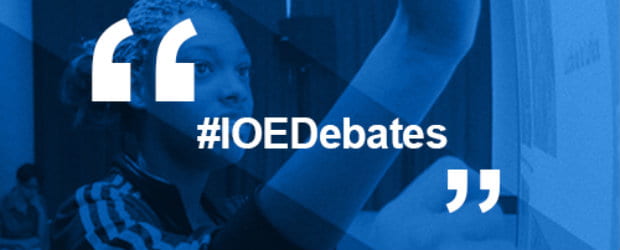Helping England’s school system to get better at getting better
By Blog Editor, IOE Digital, on 9 November 2020
Does England have a school system that’s good at getting better? And do the Covid-19 disruptions offer an opportunity to think more radically about how we accelerate higher standards for all? These were the questions raised in our latest debate – What if… we wanted more effective school improvement?
We were delighted to be joined by former London Schools Commissioner Sir Tim Brighouse; Leora Cruddas, CEO of the Confederation of School Trusts; Lucy Heller, Chief Executive of Ark Schools and, in the chair, TES editor Ann Mroz.
Taking us on a potted history of school improvement, the debate talked us through the emergence, in the 1970s, of the very idea that schools could be improved, to the heyday of Local Education Authorities, ambitious initiatives like the London Challenge, and on to the ‘school-led’ epoch we have today.
It’s a journey that’s far from concluded. Questions remain about the consistency with which over 2,000 Multi-Academy and stand-alone Trusts can raise standards, and how the Department for Education organises school improvement with such a large number of separate entities. This ‘middle tier’, or rather its middle tier functions, or system governance, is vital to schools’ performance, so wherever it takes place it needs to be done well for the system to prosper. Take a listen to the discussion to see which panellist’s perspective chimes most with your own experience of school-led improvement.
Most of all, system governance needs to ensure high quality teacher professional development. On that our panellists agreed that this is still often overlooked and misunderstood as equating to INSET days. Such short bursts of professional development offer new ideas, but these are easily lost once the teacher is back in the classroom.
There is widespread consensus that the school system requires ‘expert teaching’, where professional understanding is more embedded. Whether that’s best supported by the model of evidence-based (or informed) practice that has accompanied the schools-led system – characterised by some as a system based on ‘one right answer’ – again remains up for debate. In the current context, the needs of remote and online learning open up a new test case for the evidence base and its application to frontline practice.
On the matter of the Covid-19 context and what that could mean for the future of school improvement, our panel was unanimous that there should be no quick return to regular Ofsted Section 5 (full) school inspections. A hiatus to January 2023, as one panellist called for, could also hold out the prospect of a rebalancing of Ofsted’s activity towards its survey work and the sharing of good practice.
In the meantime, the pandemic has brought to the fore two other aspects of our school system that are closely tied to the matter of school improvement: the extent of disadvantage among pupils and its impact on their ability to access learning, and the sheer weight placed on high stakes exams – bringing to mind the image of the elephant balanced on a pinhead. Addressing these features, as much as how system governance is configured, would seem to hold the key to improving school improvement. Perhaps Covid-19 will unlock that.
For now, we wish school leaders and teachers optimism, and, in the words of one panellist, the ability to spot gaps in hedges…
To learn more about spotting gaps in hedges, you can watch or listen back to the debate here.
Check out our next debate:
VIRTUAL EVENT: What if… we took play more seriously in the schools system?
3 December 2020, 5.45–6.45pm
 Close
Close





